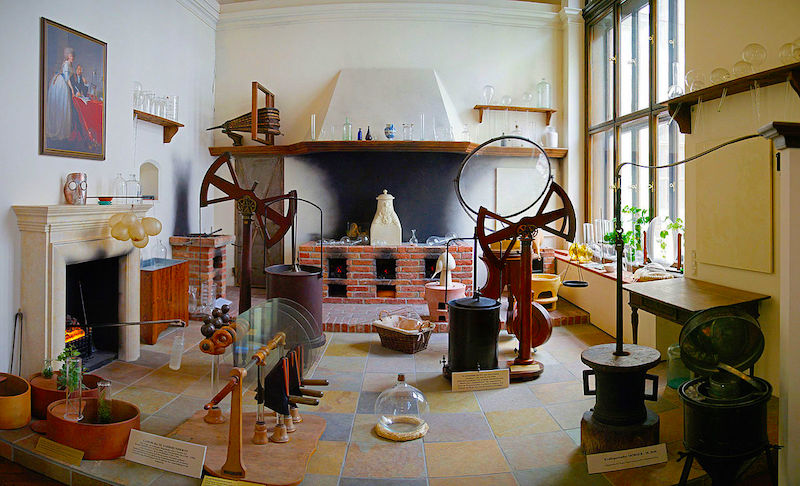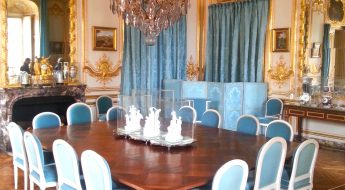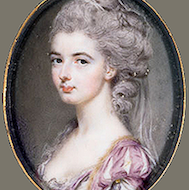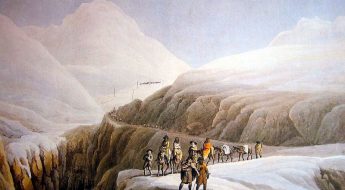
La Maréchale d’Aubemer, Nouvelle du XVIIIème Siècle, or The Widow of Field Marshal d’Aubemer: A Novella of the 18th Century, posthumously published in 1867, is a novel by the author and memoirist Madame de Boigne, born Adélaïde d’Osmond (1781-1866). Mine is the first English translation, available here for the first time anywhere.
In Chapter 10, Henri d’Estouteville’s well-laid plans prove difficult to carry through…
THE WIDOW OF FIELD MARSHAL D’AUBEMER: A NOVELLA OF THE 18TH CENTURY
CHAPTER TEN
Foiled Manoeuvres
At Magnanville, from which Lionel had promised not to stir while fully intending to do nothing of the sort, Mme de Saveuse recovered her health and part of her serenity. The company that surrounded Mme d’Aubemer was more active in the mind than in its outward habits, but the Maréchale’s house attracted very agreeable young ladies of the neighbourhood with whom Gudule rode and took the exercise that is all but indispensable at her age. She had been in the country for almost a month when Lionel, returning from one of his frequent sojourns in Paris, brought d’Estouteville back with him. During the twenty-four hours that he was to stay, there was talk of the experiments of a very gifted chemist, a friend of the Maréchale’s who was present. One question led to another, and one idea to another, until he felt moved to offer a little course in experimental physics1 adapted for these ladies of high society if he could be furnished with a space to use as a laboratory and enough time to have the necessary equipment brought. This idea enchanted Mme de Saveuse, and the Maréchale willingly lent a hand. A pavilion at a right angle to the main courtyard was chosen in which to set up the laboratory. Two hours had hardly elapsed when the workmen, under the supervision of M Chevreux, were working on adapting it to its new purpose. D’Estouteville had been among those most ardent to clear away any difficulties. He adored chemistry, he said, and had shown himself to be at once sufficiently knowledgeable and sufficiently ignorant, according to need, in order to excite the zeal of the learned chemist and to be called upon quite naturally to be his assistant for the course, of which he already had quite a good notion, but during which he would also have so much to learn; thus he would have to spend quite a goodly number of days at Magnanville, seemingly without any premeditated idea doing so and purely for the love of science. He left the same evening for Paris, taking M Chevreux with him and answering for both of them that they would come back together the following week.
D’Estouteville, we cannot hide it, was perfectly pleased with himself in this circumstance. It was true that he found Mme de Saveuse a bit cold towards himself, but he was not overly concerned; he was almost tempted to see it as a good omen. He had succeeded in keeping her indefinitely within reach. Lionel was where he wanted him, and the Maréchale, the only one he feared on the field where he wanted to triumph, seemed so reassured that the suspicions she had previously conceived made it even easier to elude her surveillance. Had she not just accepted as a matter of indifference the necessarily rather prolonged sojourn that he would have to make at Magnanville? With a self-conceit that his numerous successes somewhat excused, Henri hardly doubted that he would succeed with an inexperienced young woman whom he himself qualified as “a little provincial,” while at the same time finding her charming.
D’Estouteville took care not to miss the appointment; he brought M Chevreux, who had filled the carriage with melting-pots, retorts2, pipes, etc., etc., as well as some ingredients of which each one was more dangerous than the last. Henri made a very amusing recitation of the manner in which M Chevreux stowed the various parcels in the carriage, supervising with the greatest care the handling of the delicate instruments and very casually that of the phials, which if they broke would incinerate the travellers or blow them to pieces. Henri, in contrast, claimed to have given his very special attention to these sinister travel companions during the ride that M Chevreux had made him take on this newfangled arsenal. Everyone laughed, including M Chevreux.
“You do not render sufficient justice to my prudence, Count,” he said, pulling some folded paper from his waistcoat, “Here’s a bit of powder on which the slightest friction would have had the effect of a thunderbolt, and would unfailingly have killed us both.”
Gudule shivered and felt a bit of a chill by the hearth.
“With the Maréchale’s permission, I will put it in a safe place. I did not want to entrust the transport of it to anyone but myself.”
No one was disposed to detain him.
The course solicited at Magananville and followed with great interest was reaching its end. D’Estouteville was somewhat victimized by it; M Chevreux believed completely in his pure love of science, and the ingenuous scientist frequently requisitioned his young adjunct’s able assistance to prepare the lessons, thus depriving him of moments that he would rather have employed otherwise. However, the fear of attracting Mme d’Aubemer’s attention forced him to submit to the master’s naive tyranny. D’Estouteville was therefore rather disappointed; in vain had he set the stage: the inconvenient actors dispersed, the aunt reassured, the husband as biddable as could be wished, Princesse Simon at a distance in her father’s house, where the presence of a minister that the Prince de Montford was currying favour with kept her confined. Henri had all the elbow room he needed, yet he was no further ahead for it, for in his programme he had forgotten the two principal roles; Mme de Saveuse was polite and cold in equal measure, while he, falling passionately and sincerely in love, consequently became timid and maladroit. He had not doubted being promptly able to bring Mme de Saveuse back to that state of fellow-feeling that had formed between them before the sojourn at the Duchesse de Montford’s, and the route from there to the seduction of the pretty provincial, which the habits of the world in which he lived enabled him to envisage without the least scruple, seemed to him to be clearly mapped out. He had counted on some simulated coldness, a scene, an explanation, a reconciliation — in short, on all that goes into the little dramas with foregone conclusions of a corrupted society. Henri knew women so well! That was his pretension. Yes, in fact, he intuitively guessed all the thoughts of the artificial creatures who populated the fashionable drawing rooms, but as for the simple, frank, and candid nature of Gudule, not only had he not foreseen it, he could not even explain it to himself. Her coldness was not in any way simulated; she really felt it. This was not at all anger or jealousy, still less a coquettish game. The impression was sincere. Without doubt and very much without his knowledge, the admiration she had conceived for Henri’s superiority had momentarily illuminated her life, and she had believed in the ideal being that women always dream of more or less vaguely. Accustomed without thinking about it too much to being the object of his constant attention, she had felt a great emptiness on seeing this flattering attention withdrawn from her, only to see it lavished on a person she felt to be an enemy; but then, having somewhere to attach the sadness by which she was so painfully afflicted, she had not recognized its true cause, the revival of assiduous attentions between the Princesse de Montford and d’Estouteville having renewed the tattle of society about their relations. Gudule had heard deeds of fickleness and treachery towards women recounted of him, which were repeated without malice and as lively anecdotes, but which profoundly disturbed the morality of a young person hardly out from under the paternal roof. And then, with that intolerance inherent to the early years of life, she had concluded that since M d’Estouteville did not possess all the perfections with which she had benevolently endowed him, he had to be a monster of duplicity. She thus found herself very suspicious with regard to him, and that look of mutual understanding that they had frequently exchanged in the past had ceased to be accorded to him. If he then expressed a noble or delicate sentiment, a flash of surprise passed across the eyes of Mme de Saveuse, but it was promptly followed by a disdainful smile. Nonetheless, when, after a stay of three weeks at Magnanville, Henri d’Estouteville finally had to take his leave, the pains he had taken were not entirely lost. Gudule, seeing him so perfectly amiable, so constantly good and obliging, said to herself from time to time, “It’s really too bad!” His departure left her very annoyed, but then all the inhabitants of Magnanville regretted the end of this amusing chemistry course as much as she did.
Henri had sought vainly for a chance to explain himself; however, what in any case could he have said? “I had to deflect Mme d’Aubemer’s suspicions as well as the Princesse de Montford’s jealous anger towards you.” Well assured that Gudule would have been as incensed as she was revolted by such an admission, he had no other choice than to try to retake foot by foot the terrain he had lost through an excess of cunning. In any case, calculation had drained out of his heart to the measure that passion had filled it. It was in this state of mind that he left for the garrison where he would have to reside for four months. Those four months seemed like four centuries to this young man jaded by amorous success yet in love for the first time.
Notes:
- The Enlightenment was an age of great curiosity about the sciences, which had received short shrift in earlier, more religious times. Even Voltaire conducted experiments in his home laboratory, while his mistress Mme du Châtelet translated Newton. Frederick the Great’s protégé Count Algarotti wrote a tome entitled “Newtonism for Ladies.” It should be pointed out that chemistry and physics were not sharply distinguished at the time.
- Retorts: Bulbous glass vessels with long thin necks used in the distillation or decomposition of substances.


















I have a feeling this is going to end very sadly — and morally.
You’re in for a surprise, although there will be a good deal of sadness first!